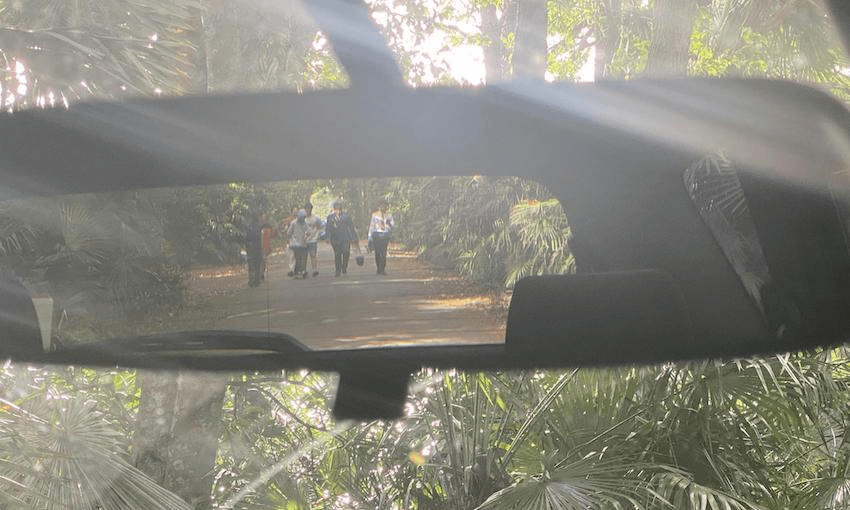For many whānau, Christmas can be a difficult time of the year, accentuating the absence of those who have passed away. Nadine Anne Hura reflects on love, loss and regret on this first Christmas without her brother.
Jimmy Barnes says that life’s too short for burning bridges, but what I want to know is whether life will be long enough to rebuild them?
Last month I watched my son walk across the stage to graduate high school. Such a short distance to travel such a long, long way.
He dropped out in his second year, leaving the dorm and the boys behind. He came home and enrolled in the local mainstream school believing he could fix things that weren’t his to fix. In his graduation speech, he spoke about the struggle to focus on school when his mind was constantly on home. He said it felt as though his world was splitting at the seams.
When he made the decision to go back to Hato Pāora for his final year, he was trying to reclaim something he thought he’d lost. Speaking to the packed auditorium, he said he’d been asked many times if he regretted leaving, but he said he couldn’t dwell on pathways not taken because the past can’t be changed, only accepted. I knew what he meant, but regret is a song and I do so love to dance.
My niece and namesake said that the reason she left the country two years ago was because she couldn’t see a way to repair all the things that were broken, and I don’t blame her because I’ve been there and done that, choosing flight over fight, even though I know we were both thinking the same thing: was there really nothing we could have done?
Regret isn’t a dance. Some days it’s a treadmill. All this punishment to go nowhere. Her dad, my brother, still not laid to rest – literally or figuratively. It’s too late to turn back time, and yet.
And yet.
My mother always said that if she had her time again, she’d do it all differently, by which she meant she wouldn’t have married my father at the age of 16. I get it, I do, but it’s hard to dissociate your own existence from the wistful look that suggests you might be the reason your parents had less choices, less chances, less energy, less education, less, less, less.
After my brother died, I took his eldest daughter back to our childhood home so she could see where we grew up. We stood at the edge of the driveway and looked. He wasn’t there, but I could see him sitting on the front steps in his red plaid shirt and black leather vest two days after Christmas, 1988. His eyes were glowing and when he smiled, he kept his lips taut to disguise that half of his front tooth was missing.
Mum’s face was flushed with the surprise of his arrival. She disappeared inside and came back with his present, berating him that she’d been worried sick. He unwrapped the box in the fading light beside the bougainvillea, and let Mum put the necklace around his neck. She touched her hand to his cheek and kissed him, and he hugged her back, even though his mates were sitting on the bonnet of their grey-blue Ford Cortina and laughing and guffawing.
Thirty-something years later his daughter wiped her eyes and sniffed.
“I keep questioning myself, and what I did or didn’t do, but I think it goes back further than me, you know?”
I nodded, wishing it didn’t have to take the death of her father to bring her home. Surely there are easier ways to build a bridge? I remember the day she was born and how crazy-protective her dad had been. He inspected people’s hands and gave out Dettol wipes before letting anyone hold her.
We weren’t to know then that the day would come when his ashes would fit into a box small enough to be held in the cup of our mother’s hands. This year is our first Christmas without him. We still haven’t decided if his necklace will return with his ashes to the soil, or stay on this side, with the living.
Regret’s a commute. Same scenery, different day. I sometimes wonder where the end of the line is. What if I took it all the way back to the beginning? Past the warning signs I either missed or ignored, back through the ominous tunnel of lockdown and the years of absence. Past the menacing footfall of a step-father, still echoing all these years later.
Past the interracial marriage of our parents, and the poverty and struggle and emigration from distant lands before that. Past the prisoner-of-war camp in Hong Kong where my grandfather spent four years. Past the departure of Hineāmaru’s people from Waimamaku after a rupture in the whānau. Back and back and back. Has the sandfly begun yet to nip the pages of the book? Does Kāwiti regret his signature on Te Tiriti? Where even is the beginning?
It’s curious to me that the closest word I can find to regret in te reo Māori is the emotion that describes yearning. Maybe burning bridges and trains are wrong metaphors. Time isn’t linear and bridges are for crossing.
I keep hearing my boy’s words over and over: the past can’t be changed, only accepted. When you think about it, it sounds a lot like whakapapa.
Maybe whakapapa is the yearning to return and keep on remembering. To continue uttering the names of those past, so we will always know where we came from and where we will return. We just keep making layers with memory, telling our whakapapa, back and back and back.
If the light is right and the season is kind, maybe we can tell it beautiful.
